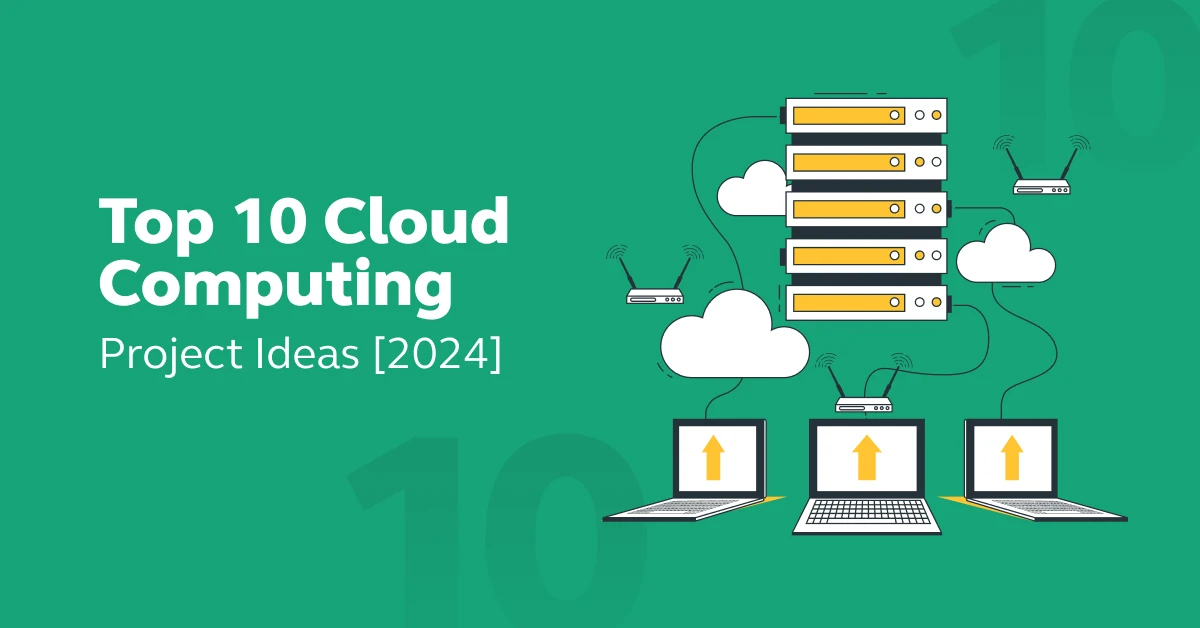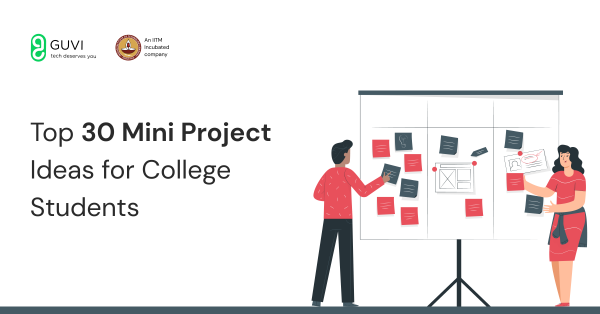
Top 15 Commerce Projects for Students in 2024: Best for B.Com & BBA
Apr 24, 2024 8 Min Read 14433 Views
(Last Updated)
Worried about the upcoming semester project? Finding good commerce projects is exceptionally crucial because of its impact on your learning and practical understanding of your desired industry or domain. Commerce is gaining a lot of popularity given its practical nature.
Given the competition, the desire to make your project stand out can make you search online for the best commerce project ideas among the others that your seniors must have done or your professors might be suggesting.
So, we have compiled a list of 14 top project ideas for commerce students, which will make you stand out and also give you ample opportunities to show your research skills and ability to show your conceptual understanding of key concepts in the commerce field. Let’s dive in.
Table of contents
- Commerce Project Ideas for Students
- Project 1: Enhancing Workforce Productivity Through Financial Rewards
- Project 2: Strategic HR Outsourcing in the Consumer Goods Sector
- Project 3: The Role of Data Science in Modern Commerce
- Project 4: Evaluating Financial Health in Corporate Acquisitions and Mergers
- Project 5: E-Commerce Dynamics in Developing Markets
- Project 6: Artificial Intelligence and Its Impact on Online Retail
- Project 7: Sustainable Consumer Practices in Modern Business
- Project 8: Analyzing the Strengths, Weaknesses, Opportunities, and Threats of a Global Corporation
- Project 9: Exploratory Analysis of International Business Joint Ventures
- Project 10: Influence of Brand Identity on Consumer Buying Choices
- Project 11: Financial Practices: A Comparative Study of Government vs. Private Banks
- Project 12: Understanding Consumer Rights through the Consumer Protection Legislation
- Project 13: Exploring Indian Exports
- Project 14: Understanding Key Distribution Channels
- How to Select the Best Commerce Project for You?
- Conclusion
- FAQs
- What are some popular project topics for commerce students?
- How do I choose the right project topic for my commerce studies?
- What should be included in a commerce project proposal?
- Can you suggest some qualitative research methods for commerce projects?
- What are some effective ways to present commerce project findings?
Commerce Project Ideas for Students
While there are various areas you can focus on while preparing a commerce project, you must choose the one that suits your subject, aligns with your interest, and offers you plenty of opportunities to conduct deep research.
In this blog, we’ll be providing you various project ideas for commerce students, their utility, key objectives that you should aim to achieve, along with the pressing questions your project must answer. So, the following are some of the best projects that can be perfect for the final year projects submission of commerce students:
Project 1: Enhancing Workforce Productivity Through Financial Rewards
Financial incentives are a classical approach to motivating employee performance, stemming from early 20th-century management theories. In today’s dynamic workplace environments, understanding the efficacy of these rewards is crucial.
This project explores the relationship between financial incentives and productivity, emphasizing its contemporary relevance in increasing organizational efficiency.
This study is pivotal for commerce to grasp the financial strategies that can enhance workforce output, making it an excellent choice for those interested in human resources and behavioral economics.
Key Objectives:
- To determine the direct effects of monetary incentives on employee performance.
- To analyze how these incentives can be strategically implemented to optimize workforce productivity.
- To evaluate the sustainability of incentive-based performance enhancement in various organizational structures.
Questions to be answered:
- What types of financial incentives are most effective at enhancing employee performance?
- How do monetary rewards influence employee motivation and productivity in the short and long term?
- What are the potential downsides of relying heavily on financial incentives?
- How do financial incentives compare with non-monetary motivators?
- What best practices can organizations adopt to integrate effective incentive schemes?
Also Read: Top 30 Data Analytics Project Ideas
Project 2: Strategic HR Outsourcing in the Consumer Goods Sector
As the consumer goods sector grows increasingly competitive, companies are turning to outsource to streamline operations and focus on core competencies. This project examines the strategic outsourcing of human resources in this sector, providing a modern context to a longstanding practice.
It offers commerce students like you insights into the complexities of HR management and the cost-benefit dynamics of outsourcing, making it essential for those interested in operations management and strategic planning.
Key Objectives:
- To explore the reasons behind HR outsourcing in the consumer goods industry.
- To assess the impacts of outsourcing on company efficiency and employee satisfaction.
- To identify the risks and rewards associated with HR outsourcing practices.
Questions to be answered:
- Why do consumer goods companies choose to outsource their HR functions?
- What are the immediate and long-term effects of HR outsourcing on operational efficiency?
- How does outsourcing HR impact employee morale and corporate culture?
- What are the financial advantages of outsourcing compared to in-house management?
- How can risks associated with HR outsourcing be mitigated?
Also Read: Top 15 Business Analyst Interview Questions With Answers
Project 3: The Role of Data Science in Modern Commerce
Data science has become integral to commerce, driving innovations and enhancing decision-making processes. This project focuses on the utilization of data analytics to solve commercial problems, offering commerce students a chance to dive into the technological advancements shaping today’s markets.
By exploring this topic, you will understand the significance of data in competitive strategy formulation and consumer behavior analysis, crucial for any aspiring business analyst or marketing professional.
Key Objectives:
- To illustrate the application of data science in resolving common commercial challenges.
- To evaluate the effectiveness of data-driven decisions in real-world commerce settings.
- To demonstrate how data science can be used to predict market trends and customer behaviors.
Questions to be answered:
- What are the primary ways in which data science is applied in commerce?
- How do data-driven strategies enhance business decision-making?
- What tools and methods are most effective in commercial data analysis?
- How can data help in understanding and predicting consumer behavior?
- What ethical considerations must be taken into account when using data in commerce?
Also Read | Can Commerce Students Become Data Scientists?
Project 4: Evaluating Financial Health in Corporate Acquisitions and Mergers
Mergers and acquisitions (M&A) are pivotal events that can redefine competitive landscapes within industries. This project offers commerce students an in-depth look at the financial due diligence process in M&As, emphasizing the critical nature of financial health assessments.
You will learn how to analyze the financial stability of companies and predict the potential outcomes of these business consolidations, which is vital for those pursuing careers in corporate finance or investment banking.
Key Objectives:
- To understand the financial due diligence process in mergers and acquisitions.
- To assess the financial health of companies pre- and post-merger.
- To identify the financial risks and benefits of mergers and acquisitions.
Questions to be answered:
- What are the key components of financial due diligence for M&A?
- How can the financial health of a company influence the outcome of a merger or acquisition?
- What are the financial risks associated with mergers and acquisitions?
- How do companies assess potential benefits and liabilities before an M&A?
- What strategies can be employed to mitigate financial risks in these processes?
Also Explore: Measuring ROI on Tech Talent Acquisition: Strategies and Best Practices [2024]
Project 5: E-Commerce Dynamics in Developing Markets
As e-commerce continues to expand, its impact on developing markets offers a unique area of study for commerce students. This project explores the role of online commerce in emerging economies, highlighting how digital platforms are becoming integral to market growth.
You will gain insights into the challenges and opportunities presented by e-commerce in less economically developed regions, which is crucial for those interested in international business, digital marketing, or entrepreneurship.
Key Objectives:
- To examine the growth of e-commerce in developing markets.
- To identify the challenges faced by e-commerce businesses in these regions.
- To explore the opportunities e-commerce provides to developing economies.
Questions to be answered:
- How is e-commerce contributing to economic growth in developing markets?
- What are the major challenges e-commerce businesses face in these regions?
- What opportunities does e-commerce create for local economies?
- How do consumer behaviors differ in developing markets compared to developed ones?
- What strategies can e-commerce businesses employ to overcome regional challenges?
Also Read | Switch from Commerce to IT with These Jobs
Project 6: Artificial Intelligence and Its Impact on Online Retail
Artificial intelligence (AI) is revolutionizing the way businesses interact with customers and manage operations. This project examines the integration of AI technologies into e-commerce, providing commerce students with a comprehensive view of how AI is shaping the future of online retail.
By analyzing the applications and implications of AI, you will understand its transformative role in enhancing customer experience and operational efficiency, which is essential for future roles in tech-driven industries.
Key Objectives:
- To explore the role of AI in enhancing e-commerce platforms.
- To assess the impact of AI on customer experience and business operations.
- To identify the future trends of AI in online commerce.
Questions to be answered:
- What are the key uses of AI in e-commerce?
- How does AI improve customer experience and operational efficiency?
- What are the potential risks associated with the use of AI in e-commerce?
- How is AI expected to evolve in the context of online retail?
- What ethical considerations must businesses address when implementing AI?
Know About the Best Product-Based Companies for AI Engineers in 2024
Project 7: Sustainable Consumer Practices in Modern Business
As global awareness of environmental issues increases, businesses are recognizing the importance of adopting sustainable practices. This project investigates green consumerism and its influence on modern business strategies.
This is an excellent commerce project to explore how sustainability can drive market trends and consumer behavior, providing essential knowledge for those aiming to implement eco-friendly practices in their future careers in business management or environmental policy.
Key Objectives:
- To analyze the impact of green consumerism on business strategies.
- To explore how businesses can integrate sustainable practices to meet consumer expectations.
- To assess the economic benefits of adopting eco-friendly business models.
Questions to be answered:
- What is green consumerism, and why is it important for modern businesses?
- How are businesses adapting their strategies to meet the demands of eco-conscious consumers?
- What are the economic implications of adopting sustainable practices?
- How do sustainable practices influence consumer loyalty and brand reputation?
- What challenges do businesses face when transitioning to greener models?
Must Explore: Top 9 Business Analytics Skills You Should Know
Project 8: Analyzing the Strengths, Weaknesses, Opportunities, and Threats of a Global Corporation
SWOT analysis is a foundational tool in strategic planning, providing a clear framework for evaluating a company’s competitive position.
This commerce project allows you to apply SWOT analysis to a multinational corporation, enhancing their understanding of global business operations and strategic thinking.
It is particularly beneficial for students interested in careers in business analysis, strategic consultancy, or management roles within international firms.
Key Objectives:
- To conduct a SWOT analysis of a multinational corporation.
- To understand how internal and external factors affect a corporation’s strategic decisions.
- To recommend strategies based on the SWOT analysis to improve company performance.
Questions to be answered:
- What are the strengths, weaknesses, opportunities, and threats facing a global corporation today?
- How do these elements influence strategic planning within multinational companies?
- What strategic recommendations can be made based on the SWOT analysis?
- How can the company leverage its strengths to address its weaknesses?
- What external opportunities and threats should the company prioritize?
Also Read About 9 Best Product-Based Companies for Project Management
Project 9: Exploratory Analysis of International Business Joint Ventures
Joint ventures represent a strategic alliance that can accelerate growth and facilitate entry into new markets. This commerce project provides an excellent opportunity for students to explore insights into the structure, challenges, and benefits of international joint ventures.
It’s an excellent study area for those interested in international trade, cross-cultural management, and strategic business partnerships, offering a practical perspective on navigating complex global business environments.
Key Objectives:
- To investigate the strategic rationale behind forming international joint ventures.
- To evaluate the benefits and risks associated with these partnerships.
- To analyze the key factors that contribute to the success or failure of joint ventures.
Questions to be answered:
- What motivates companies to enter into international joint ventures?
- What are the key benefits and risks of these partnerships?
- How can companies ensure the success of a joint venture?
- What are the common challenges faced in international joint ventures?
- How do cultural and regulatory differences impact these partnerships?
Must Read: 6 Best Real-World Applications of Business Analytics
Project 10: Influence of Brand Identity on Consumer Buying Choices
Brand identity plays a critical role in shaping consumer perceptions and purchasing decisions. This project delves into how branding influences consumer behavior, offering you valuable insights into marketing strategies and consumer psychology.
Understanding these dynamics is crucial for students aspiring to careers in marketing, brand management, or consumer research, where strategic branding can significantly impact business success.
Key Objectives:
- To analyze the impact of brand identity on consumer buying behavior.
- To evaluate how different branding strategies affect consumer loyalty and perception.
- To explore effective branding techniques in various market segments.
Questions to be answered:
- How does brand identity influence consumer purchasing decisions?
- What role does branding play in building consumer loyalty?
- How do consumers perceive different branding strategies?
- What are effective branding techniques for engaging target demographics?
- How can brands adjust their identities to align with changing market trends?
Also Read | Learn How UI/UX Boosts E-Commerce
Project 11: Financial Practices: A Comparative Study of Government vs. Private Banks
The banking sector is divided into two distinct segments: government and private banks, each with its own operational methodologies and financial policies.
This project delves into the comparative analysis of these sectors, providing you with a nuanced understanding of financial practices across different banking environments.
It highlights the regulatory, economic, and competitive landscapes that influence these institutions, making it an invaluable study for those interested in finance and banking careers.
Key Objectives:
- To compare the financial management practices of government and private sector banks.
- To investigate the impact of regulatory frameworks on these banking sectors.
- To assess customer satisfaction and operational efficiency between the two types of banks.
Questions to be answered:
- How do financial management practices differ between government and private banks?
- What role do regulatory frameworks play in shaping the operations of these banks?
- Which sector shows better operational efficiency and why?
- How does customer satisfaction compare between government and private banks?
- What are the major financial challenges faced by each sector?
Also Explore: Top 10 Unique Project Ideas for College Students
Project 12: Understanding Consumer Rights through the Consumer Protection Legislation
Consumer rights are a fundamental aspect of business law, affecting how companies interact with their customers. This project examines the Consumer Protection Act, providing commerce students with a thorough understanding of legal frameworks that protect consumers.
if you’re looking to pursue careers in business law, consumer advocacy, or regulatory roles, where knowledge of consumer rights is pivotal, this commerce project could be the perfect choice for you.
Key Objectives:
- To explore the key provisions of the Consumer Protection Act.
- To understand the impact of these laws on business operations and consumer satisfaction.
- To evaluate the effectiveness of consumer rights laws in enforcing fair trade practices.
Questions to be answered:
- What are the key provisions of the Consumer Protection Act?
- How do consumer protection laws impact business practices?
- What are common issues faced by consumers that these laws address?
- How effective are consumer rights laws at ensuring fair business practices?
- What improvements could be made to consumer protection legislation to better serve the public?
Learn How to create your own eCommerce Website like Amazon/Flipkart
Project 13: Exploring Indian Exports
Indian exports have been a major driver of the country’s economic growth, encompassing a diverse range of sectors from agriculture to technology.
This project explores the various facets of India’s export industry, providing commerce students with a comprehensive overview of international trade practices.
You will gain valuable insights into global market dynamics and trade regulations, which are essential for careers in international business or trade policy.
Key Objectives:
- To analyze the composition and growth trends of Indian exports.
- To evaluate the impact of global trade policies on Indian export sectors.
- To identify challenges and opportunities for Indian exporters in the global market.
Questions to be answered:
- What are the key sectors contributing to Indian exports?
- How have global trade policies affected Indian export businesses?
- What are the main challenges faced by Indian exporters in international markets?
- What strategies can Indian exporters use to enhance their global competitiveness?
- How does currency fluctuation impact the profitability of Indian exports?
Project 14: Understanding Key Distribution Channels
Distribution channels are the backbone of product marketing and supply chain management, connecting manufacturers to consumers.
This project allows commerce students to explore the efficiency and dynamics of various distribution methods, critical for anyone planning a career in logistics, marketing, or operations management.
The study will provide insights into the strategic selection and management of channels to maximize market penetration and consumer reach.
Key Objectives:
- To compare the effectiveness of different distribution channels.
- To analyze how distribution strategies affect consumer access and product availability.
- To evaluate the impact of digital distribution advancements on traditional channel models.
Questions to be answered:
- What are the different types of distribution channels used in modern commerce?
- How does the choice of distribution channels influence market reach and consumer satisfaction?
- What are the advantages and disadvantages of direct versus indirect distribution methods?
- How has the rise of digital commerce impacted traditional distribution channels?
- What factors should companies consider when selecting their distribution channels?
Also Explore: Top 30 Mini Project Ideas For College Students [UPDATED]
How to Select the Best Commerce Project for You?
Now that you’re aware of the best commerce project ideas, you must know that selecting the right project topic is just as crucial. Selecting the right commerce project is a crucial step for students as it not only enhances learning but also helps in building a strong foundation for future career opportunities.
The project should be engaging and valuable, challenging you to apply theoretical knowledge in practical scenarios while aligning with your academic and professional goals.
To ensure you choose a project that is both rewarding and educational, consider the following factors:
- Align with Interests: You should opt for a topic that captures your curiosity and passion. This personal interest will sustain your motivation and engagement over the course of the project.
- Industry Relevance: Choose a project that reflects current business trends and practices. This ensures that your work is timely and applicable, providing insights into the dynamics shaping today’s commerce landscape.
- Accessibility of Resources: Verify that necessary resources, such as data, scholarly articles, and software, are readily accessible. Adequate resources will enable a more comprehensive and feasible study.
- Skill Development: Identify a project that will help develop specific professional skills. This might include analytical reasoning, data interpretation, or strategic planning, enhancing both your resume and your practical capabilities.
- Expert Guidance: Ensure you have access to expert advice, whether through academic mentors or industry professionals. Guidance is crucial for gaining deeper insights and avoiding common research pitfalls.
- Opportunity for Innovation: Aim for a project that allows you to apply innovative thinking or novel methodologies. Projects that introduce fresh ideas or perspectives are often more impactful and distinguishing in academic and professional contexts.
Also Find Out 15 Reasons You Shouldn’t Buy Your College Final Year Project
Conclusion
Creating projects is an essential part of the college curriculum that introduces you to the more practical aspects of the commerce industry and the world around you while allowing you to delve deeper and find more potent solutions to existing problems.
So, choose your projects wisely and make the most out of your projects. They can be highly beneficial for your desired career and might give you an academic edge as well, setting you apart in a sea of students.
Also, Explore 8 Exciting Project Ideas for Final Year B Tech Students [2024]
FAQs
-
What are some popular project topics for commerce students?
Popular project topics for commerce students include financial analysis, consumer behavior studies, digital marketing strategies, e-commerce trends, sustainable business practices, and international trade dynamics.
-
How do I choose the right project topic for my commerce studies?
You must select a topic that aligns with your interests and career goals while choosing the right project topics. Consider current trends in the business world, such as digital transformation, globalization, or sustainability.
Additionally, seek advice from professors or industry professionals to find a topic that is both relevant and has academic or practical value. -
What should be included in a commerce project proposal?
A project proposal should include an introduction to the topic, the objectives of the study, the methodology to be used for research, a tentative timeline, expected outcomes, and the relevance of the project to the field of commerce. Clarity and conciseness are crucial to make the proposal compelling.
-
Can you suggest some qualitative research methods for commerce projects?
Qualitative research methods suitable for commerce projects include case studies, interviews with industry professionals, focus groups to gather consumer insights, and content analysis of marketing materials or business strategies. These methods help gather an in-depth understanding of the subjects.
-
What are some effective ways to present commerce project findings?
Effective presentation methods include using charts and graphs to depict financial data, creating infographics to summarize consumer survey results, preparing case studies for in-depth analysis, and using slideshows to illustrate key points and trends. Always ensure your findings are clear and well-supported by your data.





































Did you enjoy this article?